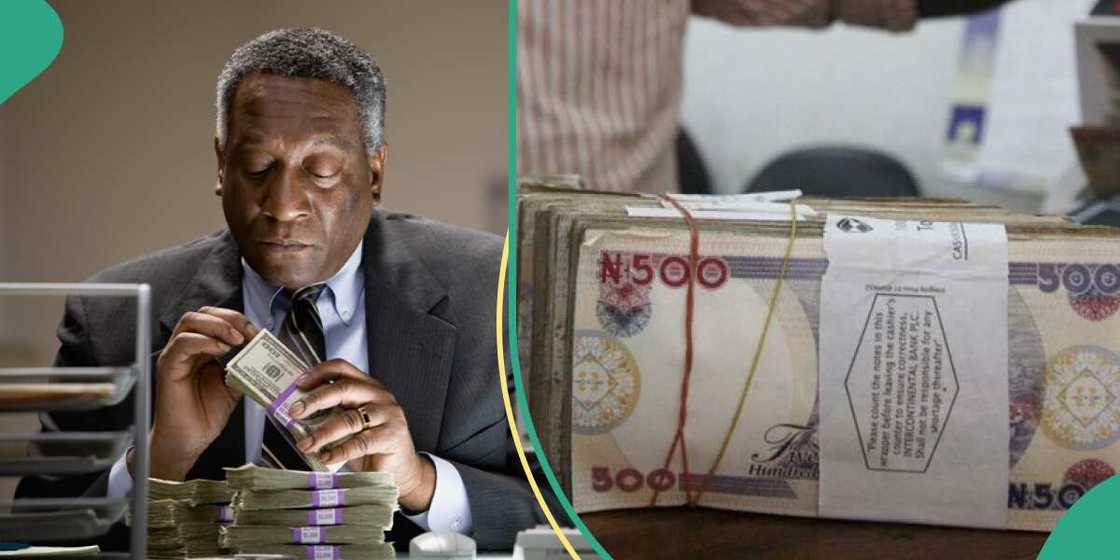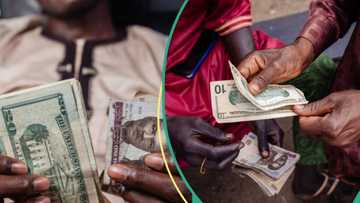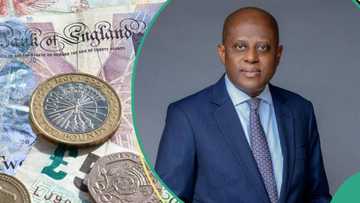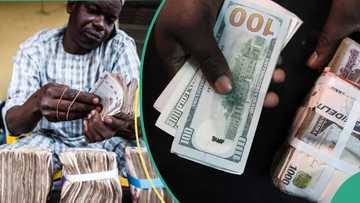“Stability is Expected to Be Temporary”: Experts Speak as Naira Finally Finds Balance Against Dollar
- It appears the naira has remained stable for a while as the local currency traded between N1,476 and N1,485 against the US dollar
- Financial analysts said that the occurrence in the market showed that the FX market is a reduction in demand largely
- This came after analysts earlier predicted that the naira would soon appreciate against the dollar following a loan from the World Bank
Legit.ng journalist Zainab Iwayemi has over 3-year-experience covering the Economy, Technology, and Capital Market.
The naira has been stable over the past month, trading in the official foreign exchange market between N1,476 and N1,485 against the US dollar; nonetheless, sustainability is still a cause for concern.

Source: UGC
The naira closed the trading week on Friday at N1,485.53 per dollar, which was not different from N1,485.36 on Thursday.

Read also
Naira crashes again against dollar, pound, euro in all FX markets, traders quote new exchange rates
According to data from the FMDQ Securities Exchange Limited, the dollar rates earlier in the week were N1,476.12 on June 3, N1,476.95 on June 4, N1,488.60 on June 5, N1,481.49 on June 6, and N1,483.99 on June 7.
PAY ATTENTION: Share your outstanding story with our editors! Please reach us through info@corp.legit.ng!
Charlie Robertson, head of macro strategy at FIM Partners UK Ltd, said,
“There is usually a level for a currency that is too cheap, which means it cannot get markedly weaker for any length of time (unless inflation is out of control). This is true for the naira today. It is so cheap the current account is probably in surplus every month. That then provides the support to stabilise the currency.”
Low demand threatens naira stability
Higher dollar inflows in recent times have been attributed to the naira's stability, as they have strengthened the country's foreign reserves.
Recall that the World Bank and Afreximbank contributed over $5.95 billion to the Nigerian economy in less than a month, bolstering the country's foreign exchange reserves and naira's value.
The Central Bank of Nigeria (CBN) reports that as of June 20, 2024, Nigeria's external reserves stood at $33.640 billion, up 2.81 percent month over month from $32.720 billion on May 20, 2024.

Read also
CBN updates British pound, dollar rate as naira crashes after banks, others shut down for 48 hours
Tajudeen Ibrahim, director of research and strategy at ChapelHill Denham, said,
“I reckon that what is happening at the FX market is a demand reduction largely because the market expects the naira to appreciate in the short term before they begin to make their demands. So demand is slowing down and reflecting on the country’s price.”
The CEO of Economic Associates, Ayo Teriba, recalled that the local currency had previously experienced stability in April following the second tightening, during which time the naira had been the world's best-performing currency before swiftly plummeting to the bottom.
He added,
“We are looking for stability for more than a month a tightening. It remains to be seen if the stability will be sustained, and one can link the stability to the reserves because it has also been stable.”
He suggested that the country focus more on increasing reserves above the point at which market volatility is expected. The country currently possesses insufficient reserves for an economy the size of Nigeria.

Read also
Currency Dealers, banks and others sell dollars at new rates as turnover rises in official market
The Association of Bureau De Change Operations of Nigeria (ABCON) president, Aminu Gwadabe, stated that the country's productivity has significantly decreased and that the departure of international corporations indicates a lack of faith in the economy. Both interest rates and inflation are declining.
He advised,
“We need to put all hands together through collaboration, cooperation and coordination. The recent stability is a welcome development but temporal as all the indices are not in our favour. Foreign investors are already catching their new climes and leaving the frontier markets. We need to be transparent and honest, create friendly and stakeholder engagement. However, this stability is expected to be temporary”
Charles Abuede, a financial analyst opined that the onus lies on the monetary and fiscal authorities to put in place friendly policies to aid the management of the fx market.
He noted,
"In saying all these, one thing is major and should be dealt with; crude oil production. If Nigeria can address insecurity and terrorism concerns, oil theft and pipeline vandalism, we can begin to see an increase in our crude oil production to above 2mbpd or even close to 2.5mbpd to aid the increase in fx receipt."
Analysts predict good rate for Naira
Legit.ng reported that financial analysts said the naira may get a lift starting this week, given the federal government's intention to use the $2.25 billion World Bank loan awarded to Nigeria.
The principal goal of the $2.25 billion loan is to support Nigeria's implementation of economic reforms that have increased revenue and caused the country's largest-ever cost-of-living crisis.
Nigeria Reforms for Economic Stabilization to Enable Transformation (RESET) Development Policy Financing is the first initiative, with an estimated $1.5 billion in funding.
PAY ATTENTION: Unlock the best of Legit.ng on Pinterest! Subscribe now and get your daily inspiration!
Source: Legit.ng



